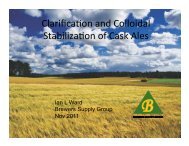Program Book - Master Brewers Association of the Americas
Program Book - Master Brewers Association of the Americas
Program Book - Master Brewers Association of the Americas
You also want an ePaper? Increase the reach of your titles
YUMPU automatically turns print PDFs into web optimized ePapers that Google loves.
P-123<br />
Environmentally friendly CIP methods and chemistries<br />
CHAD THOMPSON (1)<br />
(1) Ecolab, Inc. St. Paul, MN<br />
A summary <strong>of</strong> research conducted by Ecolab Inc.’s Global CIP<br />
Technology Group focused on development <strong>of</strong> more sustainable<br />
cleaning methods involving reduced dependence on strong caustic<br />
compositions. Laboratory results and field case studies will be<br />
reviewed that demonstrate improved cleaning <strong>of</strong> hard to remove<br />
brewhouse and fermentation vessel soils using novel chemistry<br />
and methods that reduce alkali, acid, and phosphate wastewater<br />
discharge to <strong>the</strong> environment.<br />
Chad Thompson has over 15 years <strong>of</strong> packaging engineering<br />
experience and in 2007 joined <strong>the</strong> Brewery group in <strong>the</strong> Food<br />
& Beverage division <strong>of</strong> Ecolab, Inc. as <strong>the</strong>ir lead scientist. His<br />
responsibilities include <strong>the</strong> development and commercialization <strong>of</strong><br />
new cleaning, sanitizing, and lubrication products for <strong>the</strong> brewery<br />
industry. He has been brewing for 10 years and has been with<br />
Ecolab for 4 years. During his time at Ecolab, Inc. he has contributed<br />
to numerous business segments within <strong>the</strong> corporation. Chad is<br />
a contributing member <strong>of</strong> <strong>the</strong> MBAA. He received a degree from<br />
Michigan State University in packaging engineering and has been<br />
granted three patents for his work.<br />
P-124<br />
Water/wastewater sustainability techniques for breweries<br />
JEFFREY VANVOORHIS (1)<br />
(1) Symbiont Science, Engineering and Construction<br />
The brewing process requires a significant quantity <strong>of</strong> high quality<br />
water and consumes substantial levels <strong>of</strong> energy. Water is becoming<br />
an increasingly scarce resource than an assumed widely available<br />
ingredient. Energy costs continue to escalate in all geographic areas.<br />
These factors can dramatically impact a brewery’s operations and<br />
overall pr<strong>of</strong>itability. Implementing water conservation and reuse<br />
techniques can lead breweries to higher levels <strong>of</strong> sustainability and<br />
benefit operations and pr<strong>of</strong>itability. Water is <strong>the</strong> largest ingredient<br />
required in brewing. The quality <strong>of</strong> <strong>the</strong> water can impact <strong>the</strong> brewing<br />
process and <strong>the</strong> overall quality (taste, color, smell) <strong>of</strong> <strong>the</strong> product.<br />
The specific water quality parameters are determined individually<br />
by each brewery. Reduced water quality has forced additional water<br />
treatment steps and increased water costs. Breweries can make a<br />
significant impact on local regions by conserving water use. The first<br />
step in water conservation is to determine water usage throughout<br />
<strong>the</strong> entire brewery. Specific locations and metering methods will<br />
be outlined. General water use unit factors will also be presented.<br />
The brewing process generates several unique high strength wastes<br />
as by-products. Many <strong>of</strong> <strong>the</strong>se waste streams can have beneficial<br />
reuse applications. Spent grains and spent yeast have nutritional<br />
value as feed supplements and can be integrated into composting<br />
operations. The process wastewater generated by breweries typically<br />
has a high concentration <strong>of</strong> biochemical oxygen demand (BOD) from<br />
<strong>the</strong> carbohydrates and protein used in brewing. Brewery wastewater<br />
typically has an elevated temperature. The combination <strong>of</strong> soluble<br />
BOD and warm temperature make brewery wastewater an ideal<br />
substrate for anaerobic treatment. The anaerobic treatment <strong>of</strong><br />
wastewater biologically transforms soluble BOD into an alternative<br />
fuel source known as biogas. Methane rich biogas has many<br />
potential applications such as supplementing natural gas to boilers<br />
and dryers. Biogas can also be used to produce electricity and heat<br />
in internal combustion engines, microturbines, fuel cells, and<br />
stirling engines. Biogas can even be used in cooling applications<br />
with absorption chillers. Examples <strong>of</strong> biogas utilization installations<br />
in breweries will be presented. Disposal <strong>of</strong> wastewater even at<br />
pretreated qualities can be difficult. Many municipal sewer and<br />
treatment systems have hydraulic or organic loading bottlenecks.<br />
Several food and beverage plants have been forced into additional<br />
treatment <strong>of</strong> process wastewater for reuse within <strong>the</strong>ir facilities.<br />
The use <strong>of</strong> multistage membrane treatment can result in nearly pure<br />
water quality that is <strong>of</strong>ten more pure than domestic or well sources.<br />
The reuse <strong>of</strong> water in breweries would significantly reduce water<br />
demand and disposal needs. Examples <strong>of</strong> water reuse projects will be<br />
presented.<br />
Jeffrey C. VanVoorhis is an environmental engineer with Symbiont<br />
Science, Engineering, and Construction. Jeff specializes in managing<br />
water and wastewater treatment projects for <strong>the</strong> food and beverage<br />
industries. Jeff is a member <strong>of</strong> MBAA District Milwaukee. Jeff has<br />
over 13 years <strong>of</strong> engineering experience and has worked on many<br />
phases <strong>of</strong> beverage industry projects, including treatability studies/<br />
testing, waste minimization audits, engineering design and project<br />
permitting, and construction-related services. Jeff is a Wisconsin<br />
native who earned a B.S. degree in civil engineering from Purdue<br />
University and a MBA from Marquette University.<br />
127



